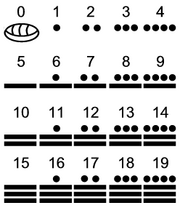Many of us have just gotten the hang of writing '2011' on our school papers and checks, and in just over a year and a half, a dusty old calendar mapped by an ancient culture neck deep in polytheism and human sacrifice predicts we will all die horrible, tragic, unavoidable deaths.
Wait, what?
I don't think anyone's been able to escape the spread of the "2012" urban myth, and I'm willing to bet that over 90% of the people who've heard of it understand that it's a bunch of malarkey. However, there's still that somewhere-less-than-10% who believe in it, and even those who shrug it off probably don't know
why it's ridiculous. Doing a bit of research, I've been able to come up with an explanation for all this trouble (also, I hope no modern Maya are offended).
 |
| The Mayan Calendar Tablet. I admit to having no clue what it says. |
Basically, the Mesoamerican Long Count Calender ran (or runs) on a system of base-20, instead of the base-10 system we use. In base-10, we have ten numbers (0-9) per column, and each addition past that tenth number cycles into the next column and restarts the original column (thus, 09 becomes 10, 099 becomes 100, and so on). The Long Count Calender just uses 20 numerals instead of 10 (actually, at one point it reverts to base-18, but let's keep it simple for now).
We translate their calender to look like this: 0.0.0.0.1 for one day, 0.0.0.1.0 for twenty days, and so forth.
 |
| Mayan Numerals, according to Wikipedia. |
December 21st, 2012, on our calendar, is the day the Long Count calender shifts from 12.19.19.17.19 to 13.0.0.0.0. According to the Mayan creation myth, it took the gods
four tries to successfully make humans, each attempt lasting 13.0.0.0.0 days of the Long Count calendar (according to some accounts). Therein lies the myth, that if each previous age lasted 13.0.0.0.0 days, this age too will only last 13.0.0.0.0 days before the gods start over.
There doesn't seem to be any actual Mayan belief to back this up. This time around, the gods got it right, so why would they start over again? There are even numerous accounts of Mayan stories referring to times later than 13.0.0.0.0, and the calendar should at least continue on to 19.19.19.17.19 before cycling back to 0.0.0.0.0 (or, as some believe, cycle up to 1.0.0.0.0.0).
Besides, shouldn't the only people concerned the end of the fourth age be those who believe that version of the Mayan creation myth? It's not like we go around preparing our souls for
Duat or
Hades. It's ridiculous to think that the ancient Mayans could be wrong about their gods and everything else (as modern people believe) but be right about the end of humanity.
 |
| Oh no! We haven't sacrificed anyone to the Volcano gods lately - we're DOOMED! |
So if few, or perhaps none, of the ancient Mayans believed this, then where did the belief come from? In my opinion, humans are obsessed with the idea of the end of the world. Almost every major culture and religion had and has a end-of-the-world story, from
Armageddon and the
Apocalypse to the
Ragnarok and even the famous "
Chicken Little" folktale. It would've been easy for some layman to see this Long Count calendar, misconstrue its meaning, and make a movie about it.
 |
| Like this. |
Because seriously - had anyone ever heard of this before 2007? The movie came out in 2009, and if we figure it took them two years to build up interest and then actually film, they probably released their first hoax end-up-the-world website in 2007 or 2006. Seeing as we're all obsessed with our impending doom anyways, it wouldn't have been hard to get the idea popularized.





No comments:
Post a Comment